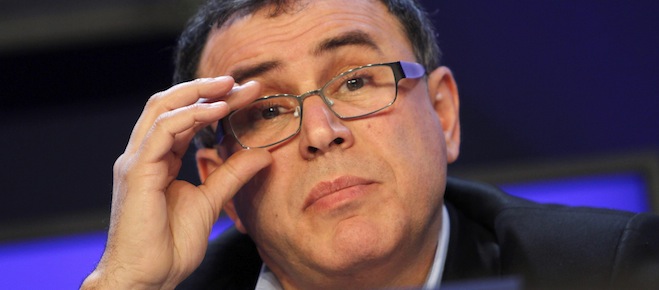Dr. Doom: why bondholders are partly to blame for America’s fiscal mess
Nouriel Roubini says investors aren’t putting enough pressure on Washington politicos
Professor of Economics, Leonard N. Stern School, NYU, USA, Nouriel Roubini adjusts his glasses during a session at the World Economic Forum in Davos, Switzerland on Wednesday, Jan. 26, 2011. Buoyed by a burst of optimism about the global economy and mindful of the “new reality” that has framed it in the aftermath of the financial crisis some 2,500 business leaders, politicians and social activists will tackle an array of issues on the first day of the World Economic Forum. (AP Photo/Virginia Mayo)
Share

Expect the U.S. to continue kicking the fiscal cliff, the debt ceiling and similar artificial deadlines down the road for a while longer, economist Nouriel Roubini told CNN in Davos, Switzerland.
READ: The debt ceiling: what just happened and what’s up next
At this year’s World Economic Forum Annual Meeting, Roubini, a.k.a Dr. Doom, was his customary gloomy self.
America is in for another twelve months of “anemic, subpar growth,” which he pegged at 1.6 per cent, and a “very high” unemployment rate. This despite a rebounding housing market, a helpful boost from the energy sector (think: shale oil and gas), manufacturing employment looking half-decent and the Federal Reserve continuing to pump money into the economy.
Most of the blame for dragging down what could be a healthy pace of growth, Roubini said, goes to the usual suspects: Washington lawmakers. Their stop-and-go tax hikes and spending cuts will likely be enough to shave 1.4 per cent off GDP growth in 2013, but not enough to address the U.S.’s long-term debt woes.
But financial markets are also to blame for America’s paralysis, Dr. Doom continued. “The bond vigilantes are asleep at the wheel,” he said, hinting at the rock-bottom interest rates at which the U.S. has been able to borrow despite its gargantuan debt and seeming incapacity to do anything about it.
Investors’ concerns over countries like Greece, Spain, Italy and Portugal have forced hard political choices in Europe, he noted. Alas, that blessing in disguise has so far eluded Washington.